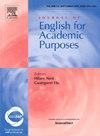香港大学一年级学生学术词汇学习策略使用的混合方法研究
IF 3.4
1区 文学
Q1 EDUCATION & EDUCATIONAL RESEARCH
引用次数: 0
摘要
虽然学术词汇对高等教育的成功至关重要,但学术英语课程往往忽视了这些词汇的教学,让学生独立学习。因此,研究学生如何运用词汇学习策略来应对学业挑战是非常重要的。在这项混合方法的研究中,我们采用问卷调查和随访访谈的方法,研究了不同学科熟练程度的一年级本科生(n = 172)的VLSs。研究结果显示,学生在不同程度上使用了一系列的VLSs。大多数学生更喜欢字典和猜测策略,而目标设定则不太常见,尤其是在更熟练的学生中。我们还发现,熟练程度高的学生在偶然学习学术词汇时表现出更大的自信。在使用字典时,他们关注的是单词知识的多个方面,而不是定义。然而,社会策略,如向老师和同学寻求帮助,没有得到充分利用,尤其是在理科生中。该研究强调了教学干预的必要性,特别是通过明确的指导来解决学生的学术词汇需求。本文章由计算机程序翻译,如有差异,请以英文原文为准。
A mixed-methods study of strategy use in academic vocabulary learning among first-year undergraduates in Hong Kong
Although academic vocabulary is crucial for success in higher education, English for Academic Purposes (EAP) courses often neglect the teaching of such vocabulary, leaving students to learn it independently. It is thus important to examine how students employ vocabulary learning strategies (VLSs) to meet their academic challenges. In this mixed-methods study, we examine the VLSs of first-year undergraduates (n = 172) with varying proficiency levels studying different academic disciplines using a questionnaire and follow-up interviews. The findings show that students used a range of VLSs to different extents. Dictionary and guessing strategies were preferred by most students, while goal setting was less common, particularly among more proficient students. We also found that highly proficient students exhibited greater confidence when learning academic vocabulary incidentally. When using a dictionary, they focused on multiple aspects of word knowledge beyond definitions. However, social strategies, such as seeking help from teachers and peers, were underutilised, especially among science students. The study emphasises the need for pedagogical interventions that address students’ academic vocabulary needs, particularly through explicit instruction.
求助全文
通过发布文献求助,成功后即可免费获取论文全文。
去求助
来源期刊

Journal of English for Academic Purposes
Multiple-
CiteScore
6.60
自引率
13.30%
发文量
81
审稿时长
57 days
期刊介绍:
The Journal of English for Academic Purposes provides a forum for the dissemination of information and views which enables practitioners of and researchers in EAP to keep current with developments in their field and to contribute to its continued updating. JEAP publishes articles, book reviews, conference reports, and academic exchanges in the linguistic, sociolinguistic and psycholinguistic description of English as it occurs in the contexts of academic study and scholarly exchange itself.
 求助内容:
求助内容: 应助结果提醒方式:
应助结果提醒方式:


